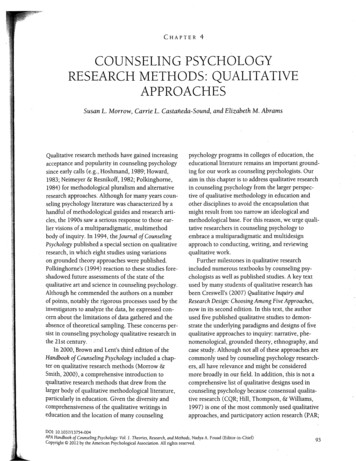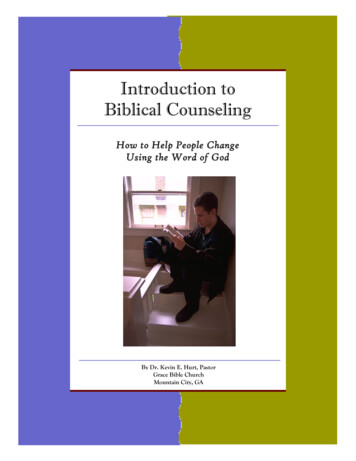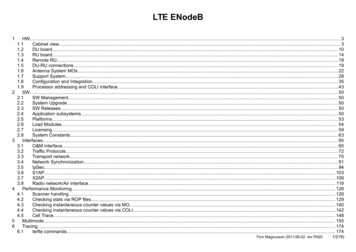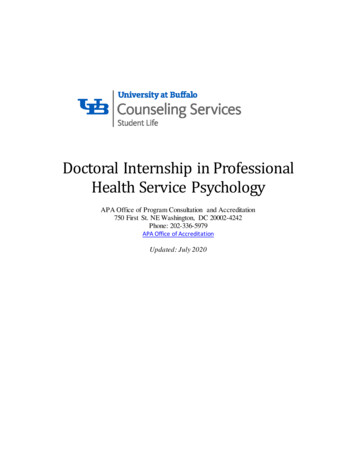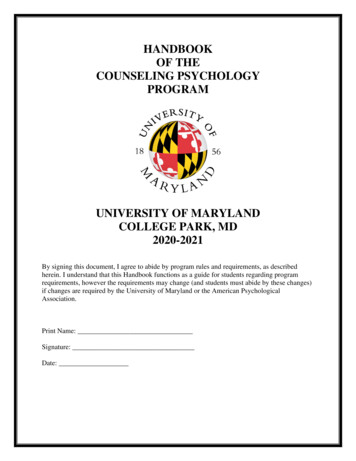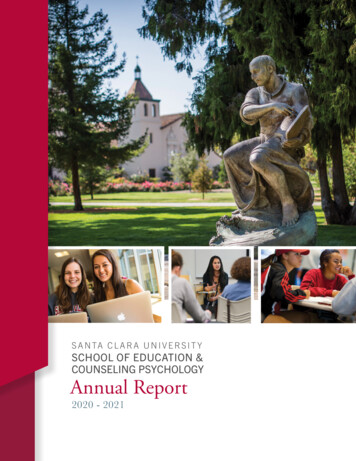
Transcription
S A N TA C L A R A U N I V E R S I T YSCHOOL OF EDUCATION &COUNSELING PSYCHOLOGYAnnual Report2020 - 20211
SANTA CLARA UNIVERSITYSCHOOL OF EDUCATION & COUNSELING PSYCHOLOGYLetter from the DeanDear Friends of the School of Education and Counseling Psychology:It is a cliché at this point to say that the academic year 2020-2021was like no other–but surely there is no truer statement to describeit. This pandemic year challenged us all in so many ways: To providea high-quality, transformational Jesuit education to our students ina new remote format; to prepare our graduate students to teach and conduct therapyremotely in their own settings; to lift our community and double-down on our anti-racistvalues in response to the killing of George Floyd and so many others. For many, thisyear brought tremendous grief and loss.This year also brought us closer. Realizing how much we need each other as acommunity. Shining a light on the educational and mental health needs of so many inour community. Lifting up each other and supporting each other in so many ways.In this year’s Annual Report on our activities in ECP, you’ll see a community comingtogether to respond: A philanthropist helps us make a long-term commitment toaddressing child and adolescent mental health needs. Another philanthropic familyhelps us fund mental health support for children and families in a school in East SanJose, and the impact of this investment reverberates. We have engaged—remotely—with a variety of thought leaders to help our community think about how the Bidenadministration can address key issues facing the Latinx community, how schoolsand colleges can better serve students of color, how bilingual educators can be trulyanti-racist in their work, and how our schools can support learning and children’smental health and social and emotional well-being in this trying time. In addition,we also launched a new Ed.D. in Social Justice Leadership to cultivate leaders ofconscience, competence, and compassion for our schools, colleges, and social impactorganizations.Please read about this incredible year and the work of our tremendous faculty, staff,and students in the pages ahead.Sincerely,Sabrina Zirkel, Ph.D.Dean, School of Education and Counseling Psychology2A Game-Changing Gift for Child and Adolescent Mental HealthA gift from Sheri Sobrato Brisson M.A. ’94 and Eric Brisson establishes an endowed chair in child and adolescentmental health and funds research and public outreach.Young people in Californiaaren’t getting the mental healthcare they need. Since 2007,hospitalizations among ages5-18 are up 50 percent, and thestate currently has less than twothirds of the therapists needed toaddress the mental health care ofchildren and adolescents.That gap is particularlyproblematic because earlysupport is beneficial in preventing more significant mentalhealth issues later on. How can we get help to kids who needit? By training more people to support them and their mentalhealth needs, which is exactly what a gift from Sheri SobratoBrisson M.A. ’94 and Eric Brisson aims to do.Sheri Sobrato Brisson“There is a significant shortage of therapists, particularlyfor underserved populations,” Sobrato Brisson says. “I hopeour gift moves the needle in thought leadership in the field,and draws people to Santa Clara for training who can goon to affect the lives of many young people in their owncommunities.”“Over 50 percent of young people in the United States willhave experienced a diagnosable mental illness by the timethey reach the age of 18,” says Dean Sabrina Zirkel of theSchool of Education and Counseling Psychology. “Sheri andEric’s gift enhances Santa Clara University’s capacity tolead in addressing these needs, allowing us to hire a leadingteacher-scholar who will expand our curriculum, attractmore students to the profession, and engage our broadercommunity to expand awareness of the mental health needsof young people.”Sobrato Brisson, who earned a master’s degree in counselingpsychology from Santa Clara University’s School of Educationand Counseling Psychology, has dedicated much of her life toserving children and teens with life-threatening or chronic illness.She is the founder of the youth resilience-building initiative,Digging Deep Project, and the creator of an award-winningmobile game to help young people build emotional health andresilience, Shadow’s Edge. She is also co-author of a youthjournaling book, Digging Deep: A Journal for Young People FacingHealth Challenges, which has been distributed in English andSpanish to hundreds of pediatric hospitals nationwide.“Santa Clara University is so grateful for the generosity ofSheri and Eric for this chair in child and adolescent mentalhealth,” said Lisa Kloppenberg, acting president of SantaClara University. “‘Journeying with youth’ is an identifiedpriority of Jesuit institutions, and this gift is a testament to ourUniversity’s commitment to youth mental health needs, whichdeepened and became more visible during the pandemic.”3
Teaching from the Heart in a PandemicTeacher candidate and high school Spanish teacher, Jose Alfaro, had to pivot this academic year, as did so manyothers. He found a way to be emotionally present with his students, even while being socially distant.At age 6, Jose Alfaro knew that he was meant to be a teacher. “Ever since I entered first grade, I remember that I simply fellin love with the classroom. During high school, though, I took AP Spanish. Mrs. Jimenez was a wonderful teacher who taughtme to follow my dreams. It was then that I learned my dream was to become a teacher and inspire others the same wayMrs. Jimenez inspired me.”4Supporting Families through Bicultural Mental HealthSchools can play a critical role in supporting the mental health needs of children and families.Child and adolescent mental health was a growing concern prior to 2020, however, theCOVID-19 pandemic magnified the strain we have been seeing in young people. One of themany lessons we have learned throughout the past year is the role that schools can play insupporting the mental health needs of children and families.As Jose began teacher preparation classes at SCU in the Fall of 2019, he was also teaching Spanish at Cristo Rey High Schoolin East San Jose. Little did he know the challenges he would face so early on in his career. “I learn a lot from students outsidethe classroom in informal conversations,” Alfaro says. “However, I could not continue having those important conversationsas easily with students during distance learning.” As the pandemic hit, Jose—like so many teachers across the country—hadto quickly adapt to teaching his students remotely. He looked to those students, examined his own values, and then beganto apply the skills he’d learned at Santa Clara in new and innovative ways. Daily check-ins over the internet, non-academicdiscussions on the phone, and remembering to teach from the heart were some of the critical strategies that contributed tothe success of Alfaro’s students this past year. These strategies are part of the holistic approach to education that is a centralvalue of the teacher education programs at Santa Clara.Mariela Rivera PerezJose embodies the Jesuit concept of “cura personalis.” He places getting to know one’s students as a top priority and focuseson the reasons behind students’ actions. This core value was needed more than ever during this pandemic.“Teaching from the heart, in my opinion, is to be understanding and never assume students are slacking off,” Alfaro says.“I make sure to always ask them how they are doing because students always have a story behind each action. I haveconstantly asked students to communicate with me and I constantly reminded them that I love them. We need to recognizethe most important tool a teacher has is being able to see a student, say hi, and simply ask how their day is going. We needto get to know our students. When we talk to them and listen to them, they feel we care.”Through this program Mariela was able to utilize a wide range of approaches to reach children and families and to providesupport to those in need. Classes and workshops relating to social and emotional well-being were offered to middle schoolers,and these often served as a pathway for those who needed additional individual counseling. Parent learning was supportedthrough virtual workshops, where they were able to learn techniques for self care, how to support children’s self-regulation,what to look for in assessing their children’s emotional well-being, and signs that a child should be referred to therapy. Theparent response to the program was extremely well received. We continue to seek new ways to continue to support the mentalhealth needs of families and young people in East San Jose.With philanthropic support from Martha Molina and Tino Bernadett, Santa Clara Universitylaunched a pilot program to provide more mental health support for students and families atMost Holy Trinity School in East San Jose. Most Holy Trinity is a K-8 Catholic school in one ofthe most economically challenged areas of San Jose, and a neighborhood that was hit hard byCOVID-19. More than 50% of the Most Holy Trinity students are Latinx and Mariela Rivera Perezwas enrolled in our Latinx Counseling program to ensure access to bilingual and biculturaltherapy in the Latinx community - a need that has historically been underserved.5
FACULT Y A D D R E S S R A C I S MCombatting Racism in theClassroomWhat Happens After a Racist AttackLeaves the Headlines?Created by Associate Professor Claudia RodriguezMojica, the Anti-Racist Collective of BilingualEducators aims to tackle racism in the classroom.Associate Professor Sherry Wang conducted a study to examine the lastingimpact of anti-Asian racism in America.Galvanized by the murder of George Floyd in May 2020,Claudia Rodriguez-Mojica, an associate professor and thecoordinator of the Bilingual Education program in SantaClara’s Department of Education, launched the AntiRacist Collective of Bilingual Educators (ARCoBE), a free,optional program that teaches current and former bilingualauthorization students about the history of anti-blacknessand how to develop ways to combat racism in education andbeyond. Over the course of the past year, ARCoBE membersnot only created lesson plan, bookmarks, pamphlets, andwebsites in both Spanish and English for their classrooms,but walked a year-long, exploratory journey aimed at betterunderstanding and combating racism and white supremacyin communities and schools.What started as a way for SCU’s bilingual teachers to expressintimate thoughts and emotions and move forward from adark moment in America has grown into a grassroots effort tomake teachers of all subjects skilled in anti-racism practices.All of the educators who participated in the collective wereSpanish speakers, which added a level of intimacy andinclusion that not only made participants feel comfortable,but challenged them to confront racism in Latin America, saidfacilitators Michelle Rosas-González M.A. ’20 and HéctorGonzález Rodas M.A. ’20.Rosas-González and González Rodas helped create andfacilitate the collective’s work and have been instrumental toits continuation. The pair will soon start teaching in the dualimmersion, Juntos Program at San Miguel Elementary Schoolin Sunnyvale.“As bilingual teachers, as educators who work with Blackand brown students, we realize that our role is critical,” saidRosas-González. “We have to engage these conversationsvery carefully, not only with our students but also our families,6For Associate Professor Sherry Wang, the COVID-19virus was only part of her worries during the pastyear. A flurry of racist attacks—especially in the BayArea—served as a constant source of anxiety anddanger for Asian Americans like herself.Claudia Rodriguez-Mojicaour community members. More than anything, we wanted tobetter prepare and inform ourselves and take action in someway, particularly in response to the inequities that exist in ourcurrent education system and in our greater society.”The program has several elements, including history lessonson the origins of racism in the U.S. and Latin America andbook club discussions focused on writers of color, such asIbram X. Kendi’s How to be an Antiracist.“It was very beautiful to see how all of our colleagues cametogether,” González Rodas said. “I also think the simple factthat the space was bilingual offered a more welcoming spacefor our colleagues. We know that this is something that alsohappens in the Latinx community and unfortunately, there’sa lot of ignorance around the topic. I think Professor Mojicareally wanted to tailor this to our community as well.”Mojica, Rosas-González, and González Rodas plan tocontinue the collective in late September with a new cohort ofbilingual students. They also plan to create a website for thecollective that will include the learning materials they created,thus continuing the legacy started in 2020 and expandingARCoBE’s reach to provide access and resources to morebilingual educators.While attacks on 75-year old Xiao Zhen Xie and83-year old Gordan Pang grabbed headlines, Wangsaw little consideration given to the lasting impacton victims and how they processed these attacks.Wang began to explore this story herself throughSherry Wangop-eds in outlets like the San Francisco Chronicle,appearances on television, and in her own scholarly research.From April to October 2020, Wang recruited Asian American people nationwide toshare their experiences. While the who, what, when, and where, are important to theseevents, Wang focused on open ended questions that provided space for victims toprocess their racial trauma.Wang’s research showed a complicated and distressing reality for Asian Americanpeople. A majority of participants described experiencing racial slurs, physical threats,taunts, and/or physical violence — even before COVID. Respondents also said racistincidents they endured were often minimized or shrugged off.“There is no media attention on what it’s like to walk on the street the day after a racistattack,” Wang says. “There is no attention placed on the brokenness, the self-doubt,self-blame, fear, anxiety, anger and paranoia. Asian Americans are left to pick up thepieces on their own.The gravitational pull of the #BlackLivesMatter movement also added complexity tothis trauma. For some participants, it served as greater fuel and motivation to activelydismantle white supremacy. For others, there was a sense of competition.Wang’s research will be published in scholarly journals in 2022, with initial findingsshowing that anti-Asian racism is even more prevalent than what is sensationalized inmainstream media. Anti-Asian racism is not only perpetrated through violence, it is alsosubtle, cumulative, unintentional, casual, and much more widespread than we think.“It’s easy to condemn overt, indisputable violence against Asian Americans,” Wangsays. “But society also has to tackle the other forms of anti-Asian racism before theybuild to the level of violence.”5
LATI NX R E S E A R C H C E N TE RLATINX R E S E A R C H C E N TE R (L R C )LRC’s Distinguished Speaker SeriesThe Latinx Research Center virtually hosted a number of distinguished speakers during the 2020-2021 academic year. Lindsay Pérez-Huber, associate professor of social and cultural analysis of education at California State University,Long Beach, provided a new understanding of the everyday and systematic racism that emerges in schools, colleges,and universities, and specifically how it negatively impacts students of color. Pérez-Huber supplied strategies that canbe used to disrupt everyday racism and suggested what institutions need to consider to move towards racial equity. Gilberto Conchas, professor of education at Penn State University, and Nancy Acevedo, associate professor ofeducation at California State University, San Bernardino, discussed their new book: The Chicana/o/x Dream: Hope,Resistance, and Educational Success. Based on interview data, life testimonies, and Chicana feminist theories, TheChicana/o/x Dream profiles first-generation, Mexican-descent college students who have overcome adversity byutilizing various forms of cultural capital to power their academic success.Tiempo Extra Panel Discussion: What are the Latinx Priorities We Want to Push withthe Biden Administration?“Tiempo Extra” is a nod to the soccer term “overtime” and signifies SCU’s extra effort to engage in intellectual andscholarly conversations about the Latinx community’s education and well-being. In February, the Latinx Research Centerhosted an online panel to discuss the policy priorities of the Biden Administration as they relate to the Latinx community.The panel included Omar Davila Jr., Ph.D. (assistant Professor at SCU), Maricela Gutiérrez (executive director, Services,Immigrant Rights and Education Network), Ron Gonzales (president/CEO, Hispanic Foundation of Silicon Valley), MelanyCortes ’22 (co-chair of Hermanas Unidas), and Gianella Ordonez ’23 (member of Hermanas Unidas).Publication: Journal of Leadership, Equity, andResearchJournal ofLeadership,Equity, andResearchListening to Latina/o/x Voices embraces the overwhelming fact thatLatinas/os/xs constitute an important and growing share of the U.S.school-age population. This special edition on Latina/o/x PreK-12education brings together diverse theoretical and methodologicalperspectives, including empirical qualitative and quantitativemanuscripts centering Latina/o/x voices, and concludes with abook review confronting everyday racism.21Vol. 7 No. 2, 20Special EditioneK-12Latina/o/x PrEducation9ISSN: 2330-645ClearVoz.com8Key FindingsA special issue entitled, Listening to Latina/o/x Voices: MaximizingOpportunities and Minimizing Obstacles in Distinct EducationalContexts has been released with the Journal of Leadership, Equity,and Research.The special edition on Latina/o/x education is a fortuitous labor oflove between the Latinx Research Center at Santa Clara University,the Center for Leadership, Equity and Research (CLEAR), and PennState University, with additional contributions from faculty affiliatedwith Penn State’s Center for the Study of Higher Education andUniversity of Maryland’s College of Education. High school teachers and counselors playan essential role in college messaging andencouragement.Research: Support Needed by First GenerationLatinx Students in the Transition to CollegeMarco Murillo of Santa Clara University and The Foundation forHispanic Education partnered to learn about the Class of 2019’scollege preparation and experience. High school graduatingseniors, 96% of whom identified as Latinx, were surveyedabout their college readiness, college choice, and collegeexpectations, and then provided additional information aftertheir first year in college. The findings indicate that respondentshad an overall positive transition to college but encounteredsome clear challenges that we need to better address. Overall, students felt prepared for college, but only59% felt prepared for college-level math. After one year in college, 46% of students felt theydid better academically than they expected, 31%did as they expected, and 23% felt they performedworse than they expected. More than half (56%) of respondents indicatedhaving failed one or more courses in their first yearof college, a startling statistic worthy of future study. 89% indicated utilizing college academic advisingand 70% said they’d utilized career advising.9
NEW SCH O LA R S H I P SThe Michelle U. Nguyen Endowed Scholarship in Support ofthe Vietnamese American CommunitySupporting our underserved Vietnamese community mental health needsECP alumna and advisory board member, Michelle Nguyen M.A. ’04 endowed a generousscholarship gift supporting counseling psychology graduate students whose interests are inserving the mental health needs of the Vietnamese. This donation will help us cultivate anddevelop more therapists who wish to work with those within the Vietnamese community, andas an endowment, this scholarship will last in perpetuity.Michelle U. Nguyen“We do not have nearly enough Vietnamese-speaking therapists in our region, and thisgenerous gift will help us cultivate and develop more bilingual, bicultural therapists to servethe mental health needs of the Vietnamese community,” said Sabrina Zirkel, dean of theSchool of Education, Counseling and Psychology. “Michelle’s service and generosity to thecommunity is inspiring. This gift will change lives.”Our New Ed.D. in Social Justice LeadershipSCU receives 3M NationalScience Foundation NoyceGrantCultivating strong servant leaders for PreK-12, Higher Education, and Social Impact OrganizationsOver the past two years, the dual Pandemics of COVID-19and structural racism resurfaced issues of inequityaffecting all parts of our society. From the Black LivesMatter movement to the prominence of disparities ineducation, healthcare, and the environment, our societydemands leaders who are prepared with the knowledge,skills and dispositions to make change.Over 50% of math students in California are taughtby uncredentialed teachers and SCU is committedto changing that.The need for high-quality math teachers is enormous,especially in high need communities. ECP’s Departmentof Education recently received a three year grant from theNational Science Foundation (NSF) to prepare high-qualityteachers and support teacher development in the districtwith three key aims: (a) improving teacher retention inTitle 1 schools, (b) engaging math instruction that doesnot rely on rote memorization, but rather supports anunderstanding of math as a creative and collaborativeendeavor, and (c) provides specialized support for mathinstruction to emerging bilingual students whose homelanguage is not English.10SCU will collaborate with San Jose’s Eastside Union HighSchool District, Alum Rock Union School District, and theSilicon Valley Education Foundation in supporting 20 newmath teachers in high need school districts. Fellows willreceive a full tuition scholarship to our MA and teachercredential program and a 20,000 living stipend while inthe program. Upon graduation, Fellows will receive stipendsand support to help ensure they thrive in their early yearsas teachers.As the first doctoralprogram in the Schoolof Education andCounseling Psychology,the Doctor of Education(Ed.D.) in Social JusticeLeadership programis set to launch inInaugural CohortSeptember of 2021with its inaugural cohort of 20 students. The programis designed to prepare critically reflective leaders toengage in transformative practice in addressing the mostpressing problems impacting communities and schools,such as structural racism embedded in our society. Withthree areas of specialization, students in the programcan choose an emphasis in PreK-12 Leadership, HigherEducation Leadership, or Social Impact Leadership.Built on a collaborative leadership model, students workin an intimate cohort environment as they navigate theprogram. With hopes of building a larger network andadding to the greater community, graduates will engagein meaningful conversations about what the future ofleadership looks like.“Students in the program will be asked to address thebig questions of why is society structured in the way it isand what roles schools and other organizations play inmaintaining, but also disrupting the inequities that wesee in our society at large,” says Pedro Nava, director ofeducational leadership. “In this program, we reimagine theknowledge, skills, and dispositions transformative leadersrequire to create a more just future.”Dean Zirkel notes: “We are so excited to bring togetheremerging leaders across these different sectors to learnfrom and inspire each other.”11
Re-Envisioning Your “Stretch Years”In his new book, Jerrold Lee Shapiro helps people tackle important questions as theytransition from mid to later in life.“Is it too late to change my life? Where do Igo from here? Is that all there is? Why aren’tI happier? Now that I’m all grown-up, whatdo I really want? How can I make theseyears the best of my life?”‘Of the Moment’ Thought Leadership for EducatorsIn order to support teachers and school leaders during what was a stressful, difficult, and unprecedented academicyear, SCU hosted three free virtual webinars for educators, thanks to the philanthropic support of our generousdonors. Webinars can still be viewed on ECP’s Center for Professional Development webpage.Compassion Fatigue for Educatorswith Ling LamThis webinar focused onsupporting educators duringthe COVID-19 pandemicand addressed compassionfatigue and burnout, while alsoproviding tools to assess andtreat them. Educators learneda variety of evidence-basedresiliency skills to managestress, combat the emotionaldemands of work, and preventburnout.Reimagining Education for All with KathyStoehr and Keith YocamThis webinar explored ways for educators to think innovativelytoward a post-pandemic era, where virtual learning blendedwith traditional academic contexts might incite the germinationof new teaching, learning, and pedagogical approaches.Remote Learning Approaches to Social Emotional Learningwith Tonia CasarinIn order for students to process the challenges of the pandemic, and build skills to cope, heal,and thrive, teachers need to adjust their pedagogical approaches to begin with connection.This webinar provided educators with resources to adapt their social and emotional learningpedagogical practices to remote learning.12Jerrold Lee ShapiroEven by the time we reach our early 40s,says Santa Clara University professor andclinical psychologist Jerrold Lee Shapiro,many of us have started asking ourselveswhat we want out of life as we approachwhat he calls “the stretch years” from midlife to retirement and old age.How we answer those questions, asShapiro writes in his new book “Finding Meaning, Facing Fears: Living Fully Twixt Midlifeand Retirement,” (2021 Cognella Press), isn’t just about looking back. It’s about thetime we have left to explore new ways to make meaningful changes, going forward,that could alter our lives in the most favorable ways.In his book, the longtime SCU School of Education and Counseling Psychologyprofessor, together with a group of graduate students, have woven powerful storiesfrom hundreds of people they interviewed—all around the country—about their lifetransitions and development in the post-midlife years.In this second edition, a significant update from his 2012 version with a similar title,Shapiro’s book has expanded its original focus on baby boomers, ages 45 to 65,to also incorporate research into Generation X, many of whom have now reachedtheir 40s and 50s.Underlying the content, Shapiro has added timely reflections from many of hissubjects about the recent pandemic’s impact on their lives, from relationshipsstrained by the “pressure cooker” aspects of shelter-in-place, to job losses thatmay have forced a re-calculation of retirement dates.As one interviewee put it: “I know what this means financially is that I willprobably have to work into my 70s instead of 65, but that has made me moreinterested in working smarter and doing more of what I want to do.”But it’s not all doom and gloom. The book is filled with examples of individuals in mid-life whoreconsidered their habits and actions, and moved on to healthier relationships or more fulfillingjobs, and a stronger sense of self.13
ECP Welcomes New FacultyOur Year in NumbersTeacher Education2020-2021Won Jung Kim, Ph.D.Won Jung Kim joins Santa Clara University as an assistant professor of education, with a focuson science education. Kim comes from Michigan State University, where she is finishingher Ph.D. in Curriculum, Instruction, and Teacher Education, and she previously served asa middle school science teacher in her home country of South Korea for 12 years. Kim’sresearch focuses on supporting young people and their meaningful engagement with STEM.She is devoted to exploring and challenging the concept of “rightful presence” in how we as asociety work towards achieving greater equality in STEM education.Educational LeadershipMarco Murillo, Ph.D.Marco Murillo previously served as ECP’s director of strategic initiatives, through which heserved as interim director of the Latinx Research Center, led a number of projects in East SanJose, and taught in the educational leadership program. In September 2021, he will move toa new role as assistant professor of education in the Educational Leadership program. Marcoreceived his Ph.D. from UCLA. As a first-generation, Latino scholar, Murillo seeks to challengedominant and deficit-based narratives that blame differences in educational outcomes onstudents and families because of their race, ethnicity, gender, sexuality, or immigration status.His research critically examines the educational trajectories of minoritized students, focusingon college preparation and completion.Educational LeadershipEzinne Ofoegbu, Ph.D.Ezinne Ofoegbu is an incoming assistant professor in education, where she will supportstudents in the educational leadership programs. Ofoegbu’s work and experience is in highereducation and student affairs. She has worked in a variety of roles in student services at anumber of universities, including USC and North Carolina State University. Ofoegbu’s primaryresearch focuses on the intersections of race and gender, particularly the experiences ofBlack women in various aspects of college sports and higher education. She is also exploringhow institutions can better address the residential needs of LGBTQ students, especially inLiving Learning Communities. Deeply grounded in contemporary critical theory, she combinesa strong focus theory and practice in student services within higher education.1422 . M6M 6.5M4472 Total scholarship dollarsawarded to ECP studentsOver 6M in grant applications submittedRaised in
COUNSELING PSYCHOLOGY. 2 3 Letter from the Dean Dear Friends of the School of Education and Counseling Psychology: It is a cliché at this point to say that the academic year 2020-2021 . book club discussions foc
